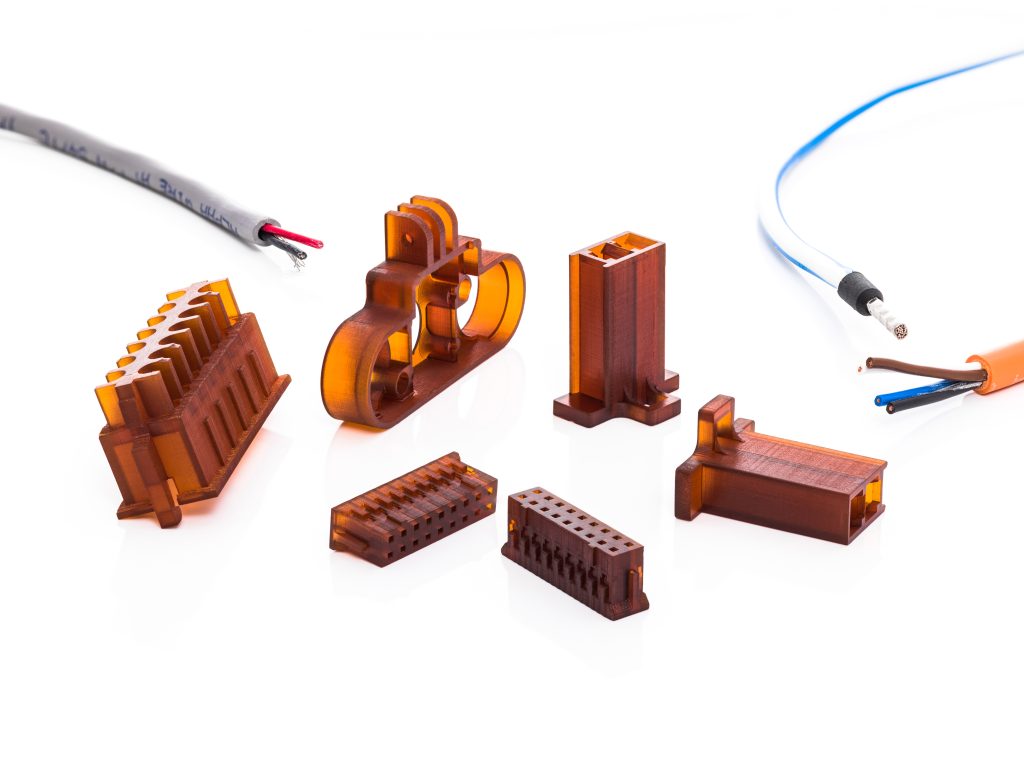Wien, 9. August 2021. Cubicure‘s high-performance photopolymer was developed to resist extremely high temperatures. Thanks to its exceptional temperature stability and a safe fire behaviour corresponding to UL94 V-0 of layers as thin as 0.45 mm, ThermoBlast is suited for injection molds and applications in the mobility industry. Now there is evidence that ThermoBlast has ideal electrical properties for the electronics industry. The material has an extraordinary dielectric strength and the highest possible standardized tracking resistance. Additional tests have shown that ThermoBlast might even find use in space technology.
New applications for an established 3D printing material
ThermoBlast has been used in additive manufacturing via Hot Lithography since 2018. Hot Lithography is a distinct method of stereolithography developed by Cubicure which allows the production of especially temperature-resistant polymers. ThermoBlast is the only photopolymer for 3D printing which exhibits a heat deflection temperature of the category HDT-A of 270 °C and afterburning of less than 10 seconds according to UL94 V-0. Until now, the material has mostly been used because of these exceptional properties: for example, parts which need to withstand high temperature soldering processes are printed with ThermoBlast.
ThermoBlast can even be used to print injection molds. Without additive manufacturing, the production of molds is the most expensive and lengthy part of the injection molding process. Thanks to Hot Lithography, companies can save money when developing new molds. Now tests have proven that ThermoBlast is suitable for more applications than previously thought, especially in the electronics industry.
A highly insulating photopolymer for the electronics industry
Because of its strength, chemically inert behavior and excellent moduli, ThermoBlast is very much suited for the use in health technology, electronics and the railway supply industry. Connectors and other electronic parts printed with ThermoBlast have a high dielectric strength. When testing for tracking resistance, the polymer reached the highest CTI norm of 600 Volts. This means that, for instance, conducting paths on ThermoBlast can be placed closer together, which allows for a miniaturization of electronic components.
To ensure that the material complies with the high fire safety standards of the electronics industry, Cubicure performed additional glow wire and oxygen index tests. The test results regarding the material’s flammability class were confirmed: ThermoBlast is fireproof even when subjected to high temperatures.
High-performance polymer with potential for the future
Now that Cubicure’s ThermoBlast has been proven to exhibit excellent flame-resistant behavior, it will be applied more often in the electronics industry. “ThermoBlast stands out from other photopolymers because it has an uncontested high heat deflection temperature”, says Dr. Markus Kury, materials product manager at Cubicure. “Because of its flame resistance and well-documented electrical insulating properties, ThermoBlast opens up new applications for our Hot Lithography technology in the sunrise industries of electronics and mobility”. While the material has already proven itself in the railway supply industry, other industries could now benefit from this photopolymer: thermal outgassing tests according to the European norm show that ThermoBlast stays stable and shows almost no mass loss in a high vacuum. This is important not only for health technology on Earth but may also bode well for Cubicure’s market entry into aeronautics and space applications.
Cubicure GmbH develops, produces and distributes industrial 3D printing solutions for polymer parts. With roots in academia and the ambition to help shape the digital future of manufacturing, this Vienna-based company has been setting the course for agile production since 2015. Their Hot Lithography process enables the unprecedented additive manufacturing of resilient high-precision components.


